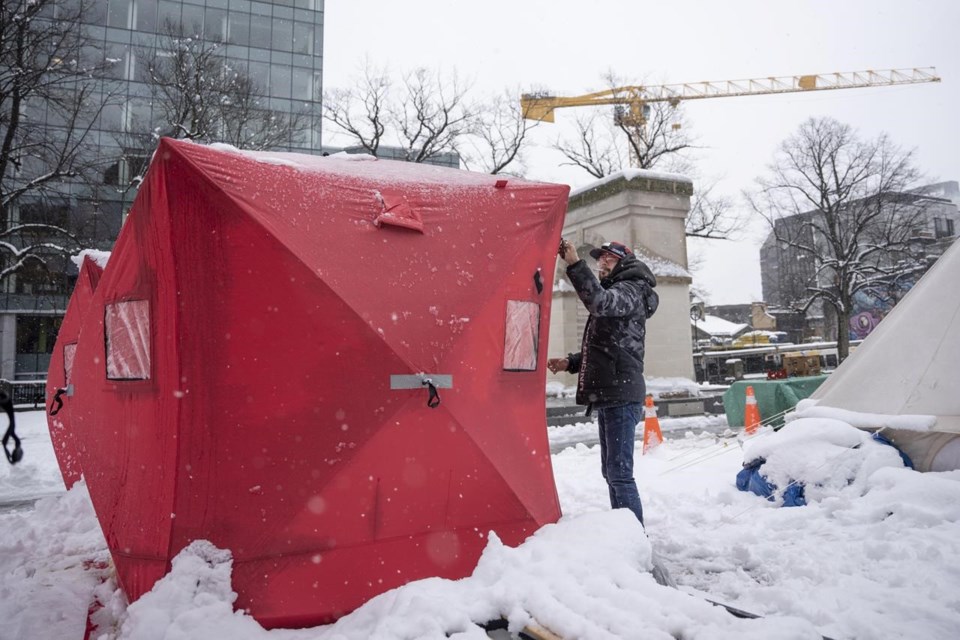HALIFAX — Volunteer groups have purchased ice-fishing shelters and a military tent to help homeless people brave the cold, wet weather in Halifax, which received its first significant snowfall of the season overnight Sunday.
Stephen Wilsack, who is a volunteer at the encampment across from Halifax City Hall, says he bought 10 tents himself and was reimbursed by "Good Samaritans." Ten other tents were donated, he added.
"This is necessary at this time because there are unhoused individuals that are literally walking the streets with no shelter," he said in an interview Monday.Â
"This is by no means a solution. The bigger issue is that there's a housing shortage and this has to be addressed immediately. We have people in encampments all around Nova Scotia."
Mike Baker, who is living in one of 14 tents erected so far, says the Eskimo QuickFish unit stays drier during heavy precipitation and is sturdier than the summer tent he was using, which collapsed in a recent windstorm.Â
"I was just in there checking my bed, and it actually is fairly dry," Baker said.
The 29-year-old says he prefers tents to indoor shelters, where he is only admitted late at night and fears people will steal his anti-seizure drugs. He's hoping to move to an apartment in a few weeks, but in the meantime the donated fishing tent will be his home.
"In the minus temperatures, it is holding up," he said, adding that he appreciates that the encampment is close to two coffee shops, his bank and a welfare worker who assists him.
The city declined to provide an interview with one of its officials who oversee the homelessness program. Instead, Halifax spokesman Ryan Nearing said in an email that the downtown encampment has been authorized by the city, which wants no more than eight tents at the site.Â
Officials said late last month "there was no way" the city could continue to authorize the area, known as the Grand Parade, for tents because of the risks posed by snow-clearing operations, but Halifax has not issued a deadline for people to leave.
Lucas Goltz, co-ordinator for the Navigator Outreach Program, says the general public is aware the provincial and municipal governments haven't yet managed to erect small shelters with electricity — known as pallet shelters — or other suitable alternatives for the roughly 1,000 people who are homeless in the city.Â
In an interview Monday, Goltz said, "people are just taking action themselves, taking things into their own hands" by purchasing the winterized shelters.
"Obviously it's better if we have people (indoors), much, much better. But considering our current situation, it's better than people staying in the tents they had," he said.
But there are still risks for people living in the ice-fishing units, Goltz warned, including that they could fall asleep while a propane heater is running, or be poisoned by carbon monoxide.
Deputy fire chief David Meldrum said in an email that city staff are "working on written guidance for residents who are living in tents and other ad-hoc shelters."
Meanwhile, at a ball field in the suburb of Lower Sackville, about 40 to 50 people living in an encampment are awaiting the arrival of a winterized, military mess tent ordered for them by a non-profit group.
Its president, Nikki Greer, said her group raised $6,000 to buy the shelter and is raising money for a wood stove. She said her non-profit is also collecting funds to buy ice-fishing tents. People woke up Monday morning inside tents covered in snow — increasing the urgency, she said, to find stronger replacements.
Greer said on Monday night at 2 a.m. she sent out messages warning people at the site in Lower Sackville to turn off their portable propane heaters, as the summer tents were collapsing inward from the weight of wet snow.
Leanne Strathdee-Dowling, a spokeswoman for the Department of Community Services, said in an email that the province has recently opened a shelter in the suburb of Dartmouth; it has 80 beds, with plans to expand to 100. As well, the province recently announced that supported housing for 32 women and gender-diverse people will be located at a former hotel. More housing announcements are coming, Strathdee-Dowling said.
The province, she added, has funded service providers, including Shelter Nova Scotia, that offer essentials to people who are homeless.Â
"This includes funding to purchase winterized tents. Recently we expanded this support by $570,000 to 11 organizations — eight in rural Nova Scotia and three in Halifax — to ensure service providers have more options for Nova Scotians in need," she wrote.
This report by The Canadian Press was first published Dec. 4, 2023.
Michael Tutton, The Canadian Press



